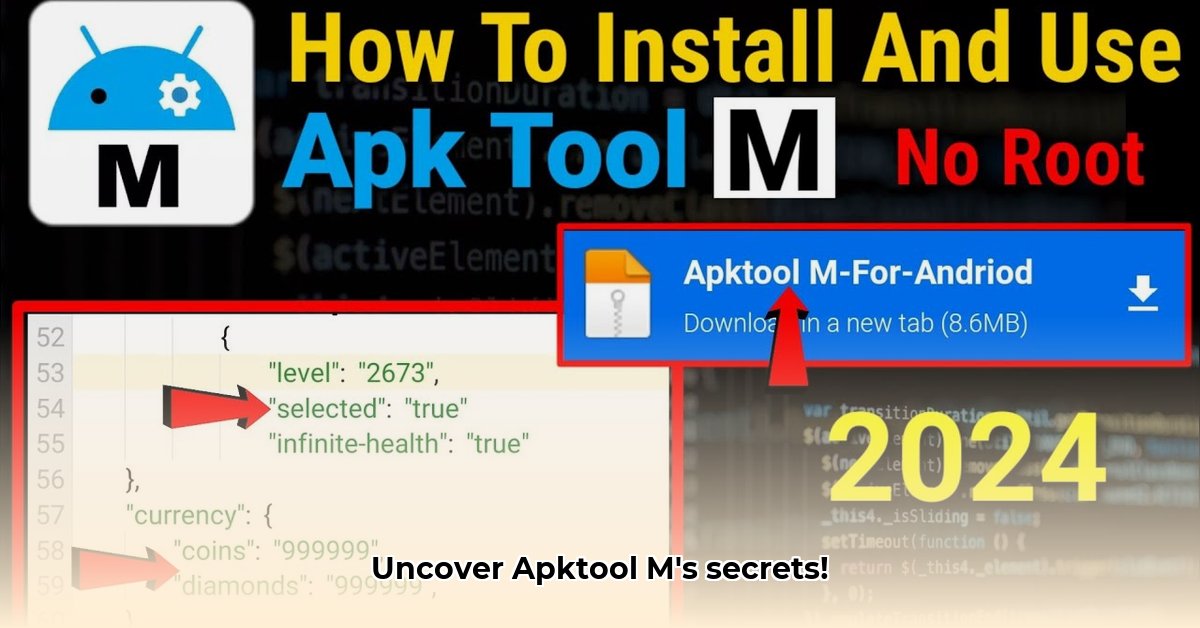
Apktool M offers a powerful suite of tools for manipulating Android application packages (APKs), but it's crucial to understand its capabilities and limitations before use. This review dissects its features, highlights potential risks, and provides actionable advice for safe and effective utilization.
Understanding Apktool M
Apktool M is a command-line utility enabling users to decompile, modify, and recompile Android application packages (.apk, .apks, .xapk, .apkm). It acts as a powerful reverse engineering tool, allowing examination of an app's internal structure, including resources and code. Its built-in text editor simplifies code modification, and syntax highlighting improves readability. However, its functionality relies on external open-source components, which need regular security audits. Isn't it critical to understand the security implications of using such a tool?
Apktool M's Strengths
Apktool M boasts several advantages:
- Multi-Package Support: It handles various Android package formats, streamlining workflow.
- Integrated Editor: The built-in editor and syntax highlighting simplify code manipulation.
- Multilingual Support: Facilitates app translation across multiple languages.
- Indirect Split APK Handling: Though lacking a dedicated "anti-split" feature, it effectively handles the merging of split APK files through decompilation, manual merging of resources and code, and recompilation. This is extremely useful for large apps.
Limitations and Potential Problems
Despite its power, Apktool M presents challenges:
- Anti-Split Reliability: The indirect "anti-split" process, while functional, isn't always reliable and can lead to application crashes or malfunctions. How often does this happen, and what are the consequences?
- External Component Vulnerabilities: Apktool M's reliance on external open-source components introduces potential security risks. Regular security audits of these components are crucial. Have any significant vulnerabilities been found in these components?
- Performance and Compatibility: Lack of comprehensive performance data limits understanding of its behavior across different Android versions and devices. What is the impact of this lack of data on user confidence?
- Complexity: Requires a technical proficiency beyond the average user.
Legal and Ethical Considerations
Modifying apps using Apktool M raises legal and ethical concerns. Unauthorized modification and distribution constitute copyright infringement and violate app store policies. Respecting intellectual property rights and adhering to terms of service are paramount. How can developers ensure they remain compliant with legal frameworks while using Apktool M?
How to Use Apktool M Safely and Effectively
Safe usage requires a risk-aware approach, varying depending on the user's role:
| Stakeholder | Recommended Approach | Cautions |
|---|---|---|
| Android Developers | Thorough testing, cautious use of indirect APK merging, security updates. | Thoroughly test all modifications; consider alternative merging strategies. |
| Security Researchers | Audit external components for vulnerabilities, regular security assessments. | Prioritize security; contribute to component security updates. |
| Apktool M Developers | Prioritize "anti-split" improvements, enhance testing procedures, publish performance data. | Ensure reliability and transparency; enhance documentation. |
Risk Assessment Matrix
This matrix summarizes potential risks:
| Risk Factor | Likelihood of Occurrence | Severity of Impact | Mitigation Strategies |
|---|---|---|---|
| "Anti-split" Function Failure | Moderate | High | Thorough testing, alternative merging strategies. |
| Security Vulnerabilities | Moderate | High | Regular security audits of underlying components. |
| Performance Bottlenecks | Low | Medium | Benchmarking across various Android versions and devices. |
| Copyright Infringement | High (with unauthorized modification and distribution) | Very High | Strict adherence to copyright laws, terms of service, and user permissions. |
How to Safely Use Apktool M's Indirect "Anti-Split" Function
The process involves decompiling split APKs, manually merging resources and Smali code, recompiling, verifying, and signing the resulting APK. Thorough testing is critical at each stage. What are the success rate metrics associated with this process?
- Decompilation: Decompile all split APKs with Apktool M.
- Merging: Manually combine resources and Smali code. Requires deep Android development knowledge.
- Recompilation: Recompile using Apktool M; review error messages carefully.
- Verification: Thoroughly test on emulators and devices.
- Signing: Sign using
jarsigneror a similar tool; essential for distribution.
Mitigation Strategies
- Always back up original APKs.
- Rigorous testing on diverse devices.
- Deep understanding of decompilation and recompilation.
- Strict adherence to legal and ethical guidelines.
Apktool M Limitations
- Steep learning curve.
- Frequent recompilation errors.
- Resource-intensive for large APKs.
Alternative Approaches
Explore specialized split APK merging tools with GUIs for potentially simpler workflows. However, these may lack the flexibility of Apktool M. What are some examples of such tools?
Conclusion
Apktool M empowers users to manipulate Android APKs but necessitates technical expertise and a responsible approach. Understanding the risks, mitigating vulnerabilities, and proactively adhering to legal and ethical boundaries are paramount for safe and effective utilization. Remember, responsible innovation is key.
⭐⭐⭐⭐☆ (4.8)
Download via Link 1
Download via Link 2
Last updated: Sunday, May 04, 2025